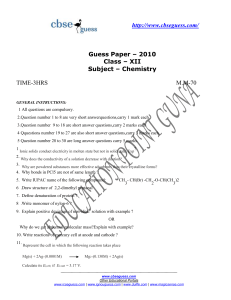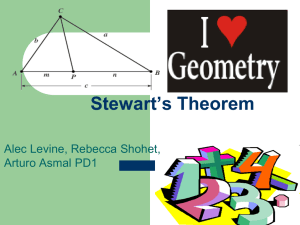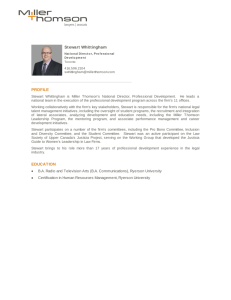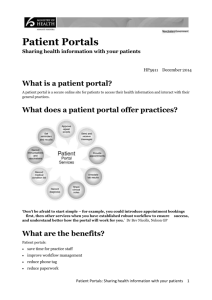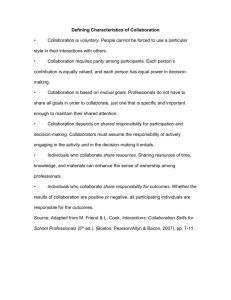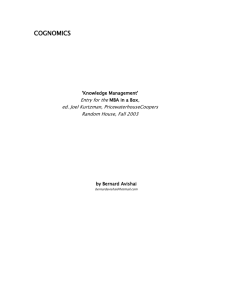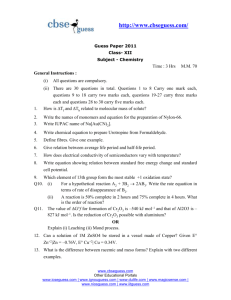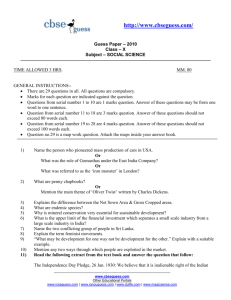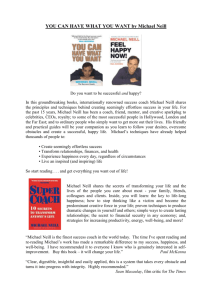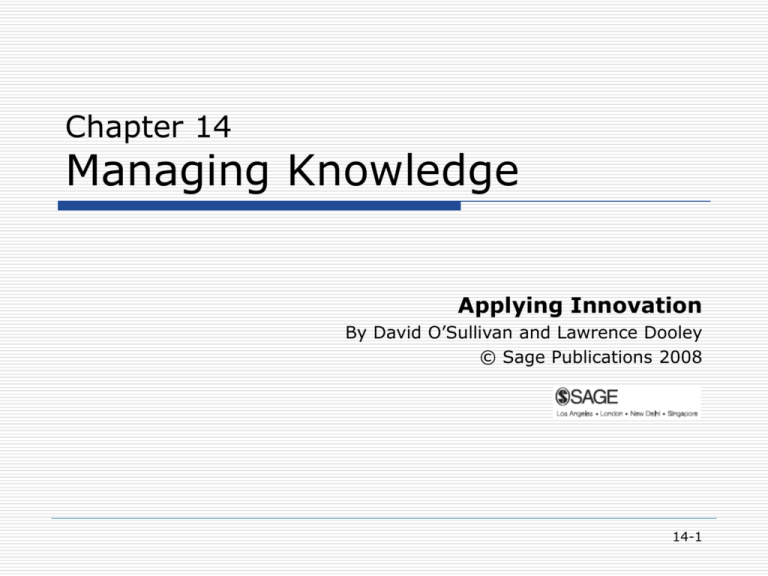
Chapter 14
Managing Knowledge
Applying Innovation
By David O’Sullivan and Lawrence Dooley
© Sage Publications 2008
14-1
Reflections
Why is motivation so important in innovation?
Give an example of intrinsic and extrinsic motivation.
What is the difference between gain sharing and
profit sharing?
Explain the performance appraisal system.
How is the need for new skills implemented in a
performance
appraisal system?
How are individual goals related to organizational
goals?
14-2
Activities
[Discussion of selected student
‘Activities’ from previous chapter]
14-3
Learning Targets
Explain the concept of knowledge and knowledge
management
Understand the various stages of knowledge
management
Describe the difference between personalization and
codification
Explain the different depths of knowledge
Explain why organizations need employees to “care
why”
Show ways in which people can collaborate in sharing
knowledge
Describe how collaboration can be enhanced through
effective meetings
14-4
Defining Knowledge
Knowledge is defined as information,
together with individual judgment
that can lead to informed decisions.
Knowledge is embodied in:
People
Culture
Procedures and routines
Systems and processes
Information systems
14-5
Knowledge Hierarchy
14-6
Knowledge Management
The process of managing information, then
making it available to people so that they
may exercise judgment in the decisionmaking process
Process consist of:
Generating and acquiring knowledge
Representing and codifying knowledge
Storing and retrieving knowledge
Sharing and distributing knowledge
Transferring and embedding knowledge
14-7
Background
Organizations utilize less than
20% of their knowledge
“If your company knew half as
much as it knows it would be
twice as productive”
14-8
Stages of Knowledge Management
14-9
Knowledge Sharing
To share knowledge appropriately, it has to
be translated from tacit to explicit
knowledge
Principal transfer mechanisms include:
Socialization
Externalization
Combination
Internalization
14-10
Codification and Personalization
Personalization of knowledge involves the
exchange of knowledge and experience
between individuals through human contact
Codification of knowledge involves using
forms, databases, etc. to allow storage and
retrieval from the organization’s
information systems.
The two approaches are not mutually
exclusive
14-11
Codification and Personalization of
Knowledge
14-12
Depth of Knowledge
Know what
Know how
Know why
Care why
14-13
Depth of Knowledge across Teams
14-14
Collaboration
14-15
Knowledge Management Tools
Support the management of knowledge
generation, codification, and sharing in
order to enhance decision making.
KM Tools include
E-mail and Web portals
Content management systems
Document management systems
Search engines
Relational and object databases
Workflow systems
Customer relationship management
Data mining and data warehousing
14-16
Collaborative Portals
Collaborative portals are computerbased systems used to generate,
represent, store, access, and retrieve
information in a distributed
asynchronous way across an
organization.
14-17
Types of Portals
Horizontal Portals
Target the entire Internet community
Google, Yahoo, MSN and AOL
Vertical Portals or ‘vortals’
Specific areas and community members
Enterprise Information Portals (EIP)
e-Business (Extranet) Portals
Personal (WAP) portals
14-18
Major Functions of Portals
Sharing information
Search and navigation
Document management
Personalization
Automatic Alerts
Task management and workflow
Integration of applications
14-19
Portlets or WebParts
Web components
Platform independent Java Servlets
Microsoft Sharepoint WebParts
14-20
Portal Vendors
14-21
Concepts, Hierarchy & R’Ships
Concepts
E.g. Organisation
Goals
Indicators
Hours per Unit
Value
Relationships
Related
Type of Relationship
Context of relationship
14-22
Columns
World Class Manufacturing Facility
Skilled Workforce
Low Employee Turnover
High Insurance premium
Lack of inter department communication
Frequent product returns due to quality issues
Increasing Manufacturing Costs
Competition from new low cost entrants
Lack of capital for new projects
Global downturn continueing
New government design grants
E-Commerce Opportunities
University Graduates
…
…
:) :( :) :| :) :| :) :( :)
Strengths
…
Strengths
Strengths
Weaknesses
Weaknesses
Weaknesses
Threats
Threats
Threats
Threats
Opportunities
Opportunities
Opportunities
…
:) :( :) :| :) :| :) :( :) :| :) :| :) :(
…
Responsible
Status
Mary Roche
Danny Mulryan
Andrew Kelly
Michael Clark
Michael Clark
Stewart O'Neill
Gary O'Halloran
Breda Mooney
Luke Davenport
David Noone
Breda Mooney
Stewart O'Neill
Stewart O'Neill
…
…
Responsible
Status
Mary Roche
David Noone
Michael Clark
Stewart O'Neill
Danny Mulryan
Michael Clark
Stewart O'Neill
Stewart O'Neill
Danny Mulryan
…
…
:) :( :) :| :) :| :) :( :) :| :) :| :|
Lists
Requirements
Group
Title
Parent
Improve Cost Structure (300k)
Parent
Greater Utilisaton of Assets
Activities
Parent
Pilot Corporate ERP System
Group Title
Customers
Reduced Lead Times
A0
Operate SwitchIt Ireland
Customers
Increased Flexibility
A1
Manage SwitchItCustomers
Ireland
Greater Quality and Reliability
A2
Plan & Control Manufacturing
Employees
Opportunity to Learn on the Job
A21
Plan & Control Materials
Employees
Greater discretion and responsibility
Regulations
Health and Safety Compliance
A22
Plan & Control Production
Environmental Compliance
A23
Assure & ControlRegulations
Quality
Community
Local Sponsorship
A3
Support Operations
Suppliers
Faster Payment Times
A31
Provide Personnel Systems
Individuals
Suppliers
More Accurate Forecasting
Accounting
Systems …
Name
JobA32
Title Control
Objectives
…
A33
Provide
Engineering Systems
Andrew Kelly
IT Analyst
Group
Title
A34
Provide
Information Systems
Breda Mooney
HR Manager Capacity
Employ low risk strategy towards capacity expansion
Capacity
Improve capacity analysis techniques
Danny Mulryan
General Manager
Capacity
Improve man-power flexibility towards capacity changes
David Noone
Engineering Manager
Statements
Capacity
Explore Make vs Buy Opportunities
Gary O'Halloran
Training Manager
Responsiveness
Collaborate on development of more accurate forecasts
Group Purchasing Manager
Title
Status
James Fogarty
Responsiveness
Explore
manufacture-to-order
processes
MissionQuality Coordinator
Efficient manufacture of
innovatively
produed switchgear
solutions
…
John Sheehan
Responsiveness
Reduce
order delivery times
Machinests
and Machining
expertise
…
Mary Roche Competencies
Finance Controller
Responsiveness
Improve
dealer access
and supplier partnerships
Competencies
Low
tax
location
and
ease
fo
market
…
Michael Clark
Manufacturing Supervisor
Organization
Migrate towards flatter and leaner organisation
Strengths
Global
Organisation
Stewart O'Neill
Materials Manager
…
…
14-23
Reduce Manufacturing Lead Time
Reduce Warranty per 1000 units per month
…
Implement eAuctions on selected items
Implement Innovation Training
Restart Sports and Social Activities
Develop Workgroup Procedures
Investigate ERP System
Objectives
Employ low risk strategy towards capacity expansion
Improve capacity analysis techniques
Improve man-power flexibility towards capacity changes
Explore Make vs Buy Opportunities
Collaborate on development of more accurate forecasts
Explore manufacture-to-order processes
Reduce order delivery times
Improve dealer and supplier partnerships
…
Redesign Assembly Line
Relationships
Objectives
Employ low risk strategy towards capacity expansion
Improve capacity analysis techniques
Improve man-power flexibility towards capacity changes
Explore Make vs Buy Opportunities
Collaborate on development of more accurate forecasts
Explore manufacture-to-order processes
Reduce order delivery times
Improve dealer and supplier partnerships
Projects
…
Install Robotic Welding
Provide Information Systems
Provide Engineering Systems
Control Accounting Systems
Provide Personnel Systems
Assure & Control Quality
Plan & Control Production
Plan & Control Materials
Objectives
Employ low risk strategy towards capacity expansion
Improve capacity analysis techniques
Improve man-power flexibility towards capacity changes
Explore Make vs Buy Opportunities
Collaborate on development of more accurate forecasts
Explore manufacture-to-order processes
Reduce order delivery times
Improve dealer and supplier partnerships
…
Plan & Control Manufacturing
Activities
Defects per Unit
Improve Cost Savings
Relationships
Reduce Absenteeism
Indicators
Increase Delivery Performance
Relationships
Relationships
14-24
Applied Innovation - Lists
GOALS
Statements
Requirements
Strategies
Standards
Indicators
ACTIONS
Ideas
Problems
Proposals
Initiatives
Deployment
Portfolio
…
RESULTS
Exceptions
Reports
…
TEAMS
Teams
Workgroups
Leaders
Reviews
…
RESOURCES
Models, Tutorial, Archive,
Advisor, Selector,
Information, Services,
Customize
COMMUNITY
Notices,
Policies ,
News, Links,14-25
Forum, Library
Applied Innovation - Lists
14-26
Example of KM system
14-27
Types of Meetings
Various levels of meeting related to
the management of the innovation
process take place across the
organization. They include:
Innovation workshops
Innovation team meetings
Steering group meeting
Project team meeting
Individual review meeting
14-28
Summary
Explain the concept of knowledge and knowledge
management
Understand the various stages of knowledge
management
Describe the difference between personalization and
codification
Explain the different depths of knowledge
Explain why organizations need employees to “care
why”
Show ways in which people can collaborate in sharing
knowledge
Describe how collaboration can be enhanced through
effective meetings
14-29
Search Online
www.microsoft.com/sharepoint
www.bscw.com
www.wikipedia.org
[keyword: collaboration software]
14-30
Activities
14-31
Copyright
Copyright © 2009 Sage Publishing, Inc. All rights
reserved. Reproduction or translation of this work
beyond that permitted in Section 117 of the 1976
United State Copyright Act without the express
written permission of the copyright owner is unlawful.
Request for further information should be addressed
to the Permissions Department, Sage Publications,
Inc. The purchaser may make back-up copies for
his/her own use only and not for distribution or
resale. The Publisher assumes no responsibility for
errors, omissions, or damages, caused by the use of
these programs or from the use of the information
contained herein.
14-32

